"Parliamentary committee is not the only option to investigate, there are also permanent bodies of the state"
We use Google Cloud Translation Services. Google requires we provide the following disclaimer relating to use of this service:
This service may contain translations powered by Google. Google disclaims all warranties related to the translations, expressed or implied, including any warranties of accuracy, reliability, and any implied warranties of merchantability, fitness for a particular purpose, and noninfringement.


The winter session of the Federal Parliament, which began on January 22, has only passed the Asset Clearance Bill, but there is no progress on other bills. On the other hand, the Ministry of Law is preparing to take the list of 117 bills related to the implementation of the Constitution to the Parliament based on priority. This session, which should be focused on the discussion on the bill, is shrouded in the shadow of the power equation.


With the change in the government's equation, the Congress, which has reached the main opposition bench, has created a deadlock in the parliament with the demand of the parliamentary committee saying that the deputy prime minister and the home minister should be investigated for embezzling the funds of the cooperative.
On the other hand, the government is under pressure to clear the impasse of the parliament and pass an urgent bill to delegate powers to the state and local levels from the current winter session. Krishna Acharya of Kantipur with the Minister of Law, Justice and Parliamentary Affairs Padam Giri Krishna Acharya , Kulchandra Nyupane and break Edited part of the interview conducted by Jaisingh Mahara
:
He was playing the role of the chief whip of the main opposition party in the parliament, after the change of alliance, he got the responsibility of the law minister. What is your priority now?
Bill drafts have come from various ministries for making laws. Studying those drafts and giving speedy approval has been prioritized. We have given first priority to the work of law making. The process of going to the Cabinet and being registered in the Parliament can proceed after the drafts of the Act related to various ministries are approved and sent. I have given clear instructions to the concerned staff, department heads that there should be no delay in these works. We have taken forward the main part of law making seriously.
The previous law minister had written to all the ministries asking them to send a list of the necessary laws, but the ministry did not work. Does it look difficult in the personnel system for the creation of laws?
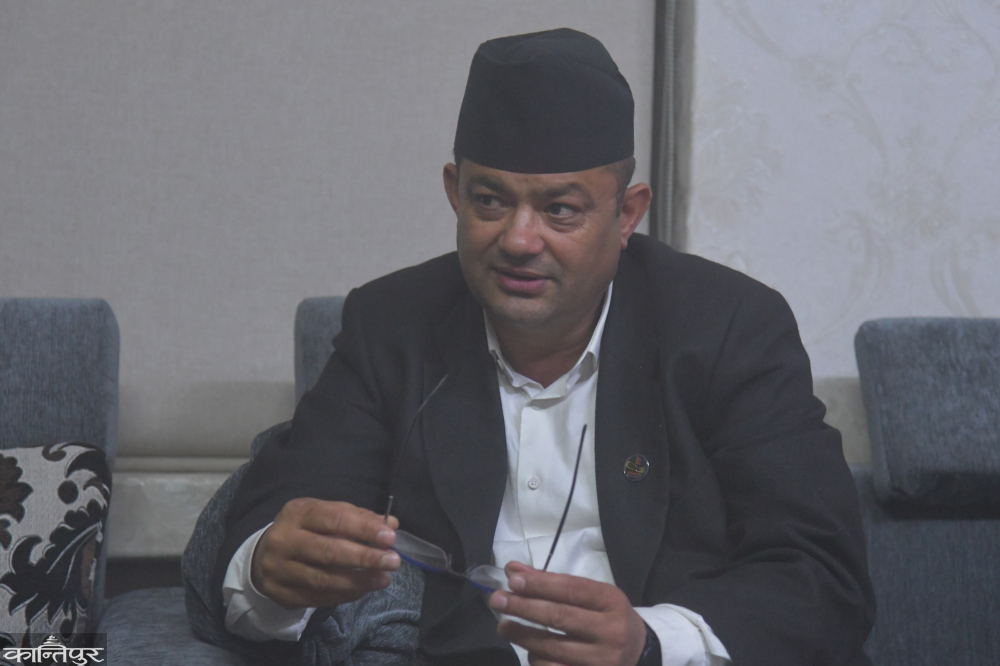 After studying the draft brought by the ministries, the process will be carried forward by making necessary additions and subtractions. It is clearly stated that attention should be paid to this matter. Drafts have come from some ministries, there was no delay in taking them forward by studying them and making the necessary corrections. It had to be carried forward at the right time. It dictates that there should be agile work.
After studying the draft brought by the ministries, the process will be carried forward by making necessary additions and subtractions. It is clearly stated that attention should be paid to this matter. Drafts have come from some ministries, there was no delay in taking them forward by studying them and making the necessary corrections. It had to be carried forward at the right time. It dictates that there should be agile work.
Photos : Deepak KC/Kantipur
Mainly we are in the process of budgeting. The time has come to create an action plan for the coming year. We have some work to do, we are in the preparation stage for it. We are thinking of forming a commission or committee related to the issue of reforming the administration of justice and making the justice process faster and faster by consulting with the Supreme Court and taking opinions from stakeholders. It should give feedback to the government. We will resolve this soon. Even now, thousands of cases in the Supreme Court have not been resolved on time. While working effectively, judgments are being made, although due to our existing system, the cases have not been resolved on time.
How can justice be given in time by studying all these subjects in detail and seriously? What needs to be improved? It can be facilitated by the ministry. For this, we are thinking of forming a working group, committee or commission and moving forward based on its suggestions. Likewise, what reforms are needed in our existing laws? What laws should be brought? A high-level commission can be formed on what can be done to simplify the existing laws.
It is said that a commission will be formed for the structural reform of the judiciary on the "minimum policy priority and common resolution" of the coalition after the participation of UML and RSWP in the government. It is understood that you feel the need for other commissions as well. Do you understand that it is difficult to work in the current structure?
has held that it is appropriate to form a task force or commission in consultation with the Supreme Court and other relevant parties to make the administration of justice faster and more efficient. It would be good if the commission could be formed. Due to various reasons, the decisions of the Supreme Court and the courts are being delayed. If those problems are addressed by forming a commission, justice will be done in a timely manner.
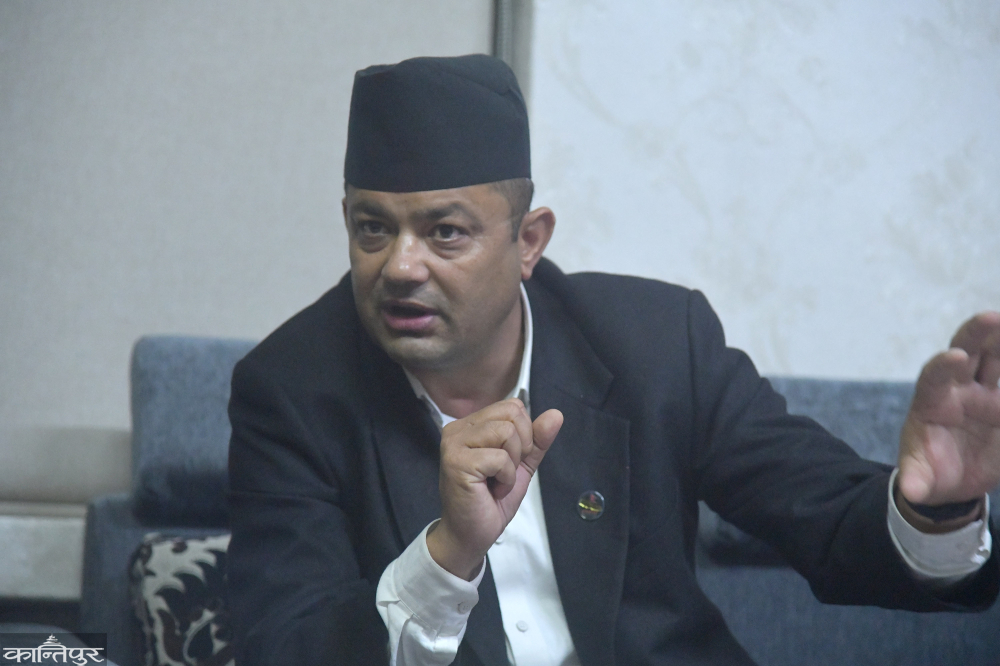 What amendments are needed in the laws now? What laws are needed? There are things that need to be simplified. To study those subjects in detail we The need for a commission has been felt. In which it will be said to form a commission with experts in this field, people with long experience and acceptable in all respects. It prepares a report after a detailed study of several Acts given a certain time and TOR. Based on that, we can take initiative to amend the laws tomorrow.
What amendments are needed in the laws now? What laws are needed? There are things that need to be simplified. To study those subjects in detail we The need for a commission has been felt. In which it will be said to form a commission with experts in this field, people with long experience and acceptable in all respects. It prepares a report after a detailed study of several Acts given a certain time and TOR. Based on that, we can take initiative to amend the laws tomorrow.
We want to establish a desk within the ministry in order to give input to this working group as well. This makes it easier for those who want to say that such an amendment to the Act would have been better. We create a digital platform that provides legal assistance to those who are in various fields. We develop a unit that categorizes the suggestions that are related to which ministries and play a role in creating an environment for making laws by sitting with the relevant ministries. What I believe is that this platform can become a milestone for creating people-friendly laws that can be amended in the future.
The winter session of the Parliament is at its last stage, we are facing the budget session. Since it is the year of Parliament, the legislation is insignificant. Dozens of bills are stuck in the parliament. The bill related to transitional justice, which the prime minister is insisting to pass, is stuck in the same way, will this bill be passed in the current session or not?
The bill related to transitional justice is a top priority of the government. Discussions are going on in the political leadership and committees to finish it quickly. Formal and informal dialogue continues at the political leadership level. This can be finalized in the near future. Since the Chief Whips of the parties in the Law, Justice and Human Rights Committee, where the bill is under consideration, have gone on a foreign tour along with Speaker Devraj Ghimire, the committee is not meeting regularly. After they return, the committee meetings will continue and we will move forward to finish the bill quickly. As the Law Minister, I am in regular contact with party leaders and other officials on this matter. On any point where consensus is not being reached, I am taking the initiative to create a common opinion and build consensus. We will come to a positive conclusion soon.
On this bill, UML had a stand when it was in opposition, it changed its stand while going from opposition to power. Similarly, Congress took a stand on two points after getting the indication that this bill should be settled through the process and had to go to the opposition bench. How will the bill related to transitional justice be decided in such a situation?
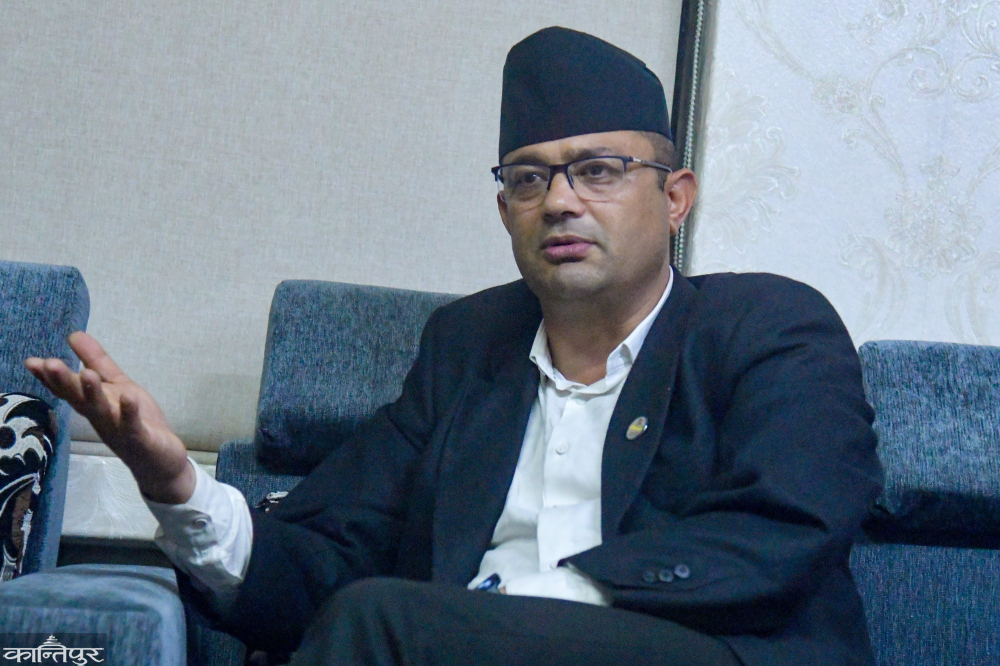 It should be resolved on the basis of consensus. Since the 12-point agreement between the main political parties on such a sensitive issue, everything is progressing on the basis of consensus. In the end, it is not so good to go on majority-minority basis. Most of the issues have been agreed upon. There was no agreement on two issues. A consensus can be reached through discussion. The common opinion of all the parties on this matter is that the process should be concluded by giving justice to the victims. There is a demand for a little discussion while reaching a decision related to that. After all the issues of this bill have been resolved, only two issues are yet to be resolved. In cases of human rights violations, what to do if the victims do not have free consent for reconciliation is yet to be decided. Likewise, the committee has yet to decide on the matter of setting the basis and reason for the reduction of the sentence or setting the percentage.
It should be resolved on the basis of consensus. Since the 12-point agreement between the main political parties on such a sensitive issue, everything is progressing on the basis of consensus. In the end, it is not so good to go on majority-minority basis. Most of the issues have been agreed upon. There was no agreement on two issues. A consensus can be reached through discussion. The common opinion of all the parties on this matter is that the process should be concluded by giving justice to the victims. There is a demand for a little discussion while reaching a decision related to that. After all the issues of this bill have been resolved, only two issues are yet to be resolved. In cases of human rights violations, what to do if the victims do not have free consent for reconciliation is yet to be decided. Likewise, the committee has yet to decide on the matter of setting the basis and reason for the reduction of the sentence or setting the percentage.
Political parties have different views on these two issues. If the victim does not freely consent, there is a risk that justice will be complained and another kind of byproduct may be born. On the other hand, if there is an open arrangement to appeal to the court in such matters, it will lead to the process of all the cases and may lead to more confusion. Therefore, a middle ground should be found in this matter. I think that this bill will be finished from the next discussion. If we can base the minimum sentence in the
bill, tomorrow the victim may not feel that justice has been done. If he could be punished even for one day, he would have been punished. If we end this bill by punishing crimes of a serious nature in such a manner, the victims may complain that they did not get justice. Therefore, we are in discussion to determine how much it is as a minimum. There has been some agreement within the committee, a little discussion has been demanded.
A bill dealing with transitional justice has long been linked to power transfers. It is said that UML did bargaining when Congress was in power. When the Congress went to the opposition today, they are saying that they should not proceed until they get a clear answer on the issue of transitional justice. After changing the power equation, there has not been a single discussion, how can you agree to pass this session?
The Congress has always kept its vision in the meeting to finalize this bill with consensus. He does not think that he will back down just because of his exit from the government. As Congress is a responsible political party, it is not appropriate to do one thing while in power and another while in opposition. As it is also an important aspect of the peace process, the Congress should not make irresponsible statements. Do not be influenced by any impulse and excitement. Congress will not go back on its previous commitments but will go further and contribute to the finalization of the Transitional Justice Bill by consensus, remaining committed to justice for the victims. Therefore, it is not appropriate to make comments based on more suspicion.
You are in the Ministry of Judiciary line. There is a provision in the constitution that a recommendation should be made one month before the vacancy of a judge in the Supreme Court. The previous government also recommended that one judge's seat be left vacant in the Supreme Court. Even now, Ishwar Prasad Khatiwada has retired and two judges' seats are vacant in the Supreme Court. Why did not follow the constitution from the government and now when will those positions be filled?
There is a provision in the constitution that the officers of the constitutional commission should be appointed one month before the vacancy, but it is not implemented in practice. There are many problems. Such a trend should not be repeated. Appointments should be made in accordance with the provisions, spirit and spirit of the constitution so that there is no place for such questions to arise in the future. For that, there is an initiative and a role that I can do from my place. We will go to the discussion for the recommendation of the vacant judge in the Supreme Court within a few days.
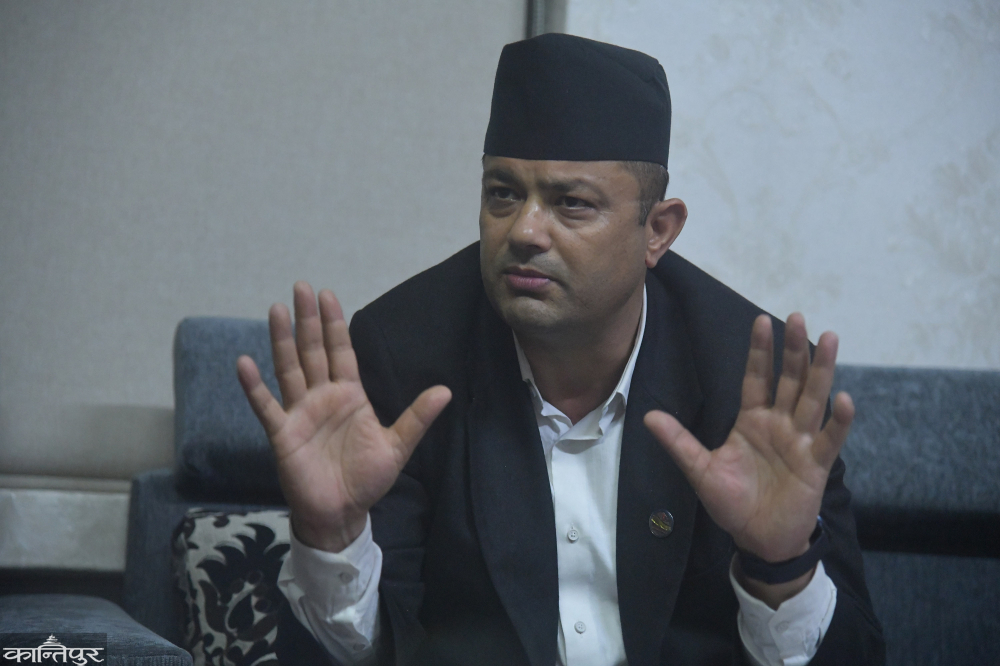 Various questions are being raised about federalism, after this it is said that the provinces have not been able to use the constitutional rights. Why is the federal government hesitating to enact laws to empower the states?
Various questions are being raised about federalism, after this it is said that the provinces have not been able to use the constitutional rights. Why is the federal government hesitating to enact laws to empower the states?
As many laws as there are to be made for the implementation of the constitution, we are trying to advance it by keeping it as the first priority. Correspondence has been sent to Ministries for speedy drafting. Some of the ministries have started to arrive, some are delaying the delivery. Secondly, as many bills are under discussion in the subject committee, we have given the first priority to the process of passing them through the committee and passing them through the House of Representatives.
It is said that the leadership of the federal government, the bureaucracy and the police are not ready to give authority to the states especially in the main bills related to federalism, including the federal police law, including civil, education, etc.?
Union, state and local level common rights of all are not immediately, many types of confusion has increased. Legislation necessary for police and civil adjustment is proceeding. Civil Bill has been introduced. Now the Ministry of Law has shown vigilance in the direction of passing the discussion in the committee. Due to lack of main laws related to the state, lower level work has been affected. The provincial government is also in trouble. A kind of confusion has been created. There is also a psychology of anxiety and uncertainty among the employees about what kind of law will come, what will be the status of the Union and the state. which is affecting the entire service delivery.
The prime minister said that even though the federal law for police adjustment has not come, it can be done based on the two laws passed earlier. However, it has come out that the police and the political leadership are not ready to adjust the police and give authority to the province. What is the reality?
The spirit of the constitution should be followed. The same is the case with the police. The police must be adjusted, there is no alternative. If the Union concentrates all the rights on itself, there is no justification for creating seven provincial structures. The entire security system should also be taken into account while adjusting. While adjusting the police, the security of the country should also be considered seriously.
There is also talk that the education, civil and other bills brought to the parliament by the previous coalition government should be amended along with the change in the equation of the government.
If many changes are required, rewriting is also required. If not, the Bills registered in the Parliament and sent to the committee will be amended through the House of Representatives. The sovereign parliament is independent of that. In this matter, there is no need to fight the war of lice. Except in cases where the concept itself needs to be changed, it can be arranged by the Parliament. So far this kind of discussion has not happened at my level.
How many laws is the government preparing to register in the parliament in this session?
The number of bills that have been given first priority is 63. There are 39 bills on second priority. Currently, 117 bills are being discussed, including 15 bills that are the third priority. Even before I came, preparations were being made in this way. Now the TRC Bill is the main priority. We advance the bill based on the priority of how much can be done in one/one and a half weeks.
The main opposition Congress is questioning the Deputy Prime Minister and Home Minister Ravi Lamichhane for being involved in co-operative fraud and is demanding the formation of a parliamentary inquiry committee. The ruling party is not ready for that. Is it possible for the bill to proceed as you said when the parliament is being held hostage by the dual stance between the government and the opposition?
As the Congress has been raising the question that the Home Minister has embezzled the funds of the cooperatives, none of the state agencies have been able to confirm the involvement of the minister. In such a situation, how reasonable is it to form a parliamentary investigation committee based on what has come out in the social media and media? Congress should have grasped some facts, evidence and basis when such a matter was raised. It does not appear. The desperation to be out of power recently has worked to some extent. A responsible party like Congress cannot create a deadlock in Parliament for a long time on such unproven issues. I believe, in the next meeting, the Congress will leave this issue and move forward. As many bills as there are in the parliament, they should be discussed and sent to the committee. If it can be sent to the committee, the discussion will open after the end of the winter session. After discussion, it can be passed in the next session. I think that the opposition will also help in this.
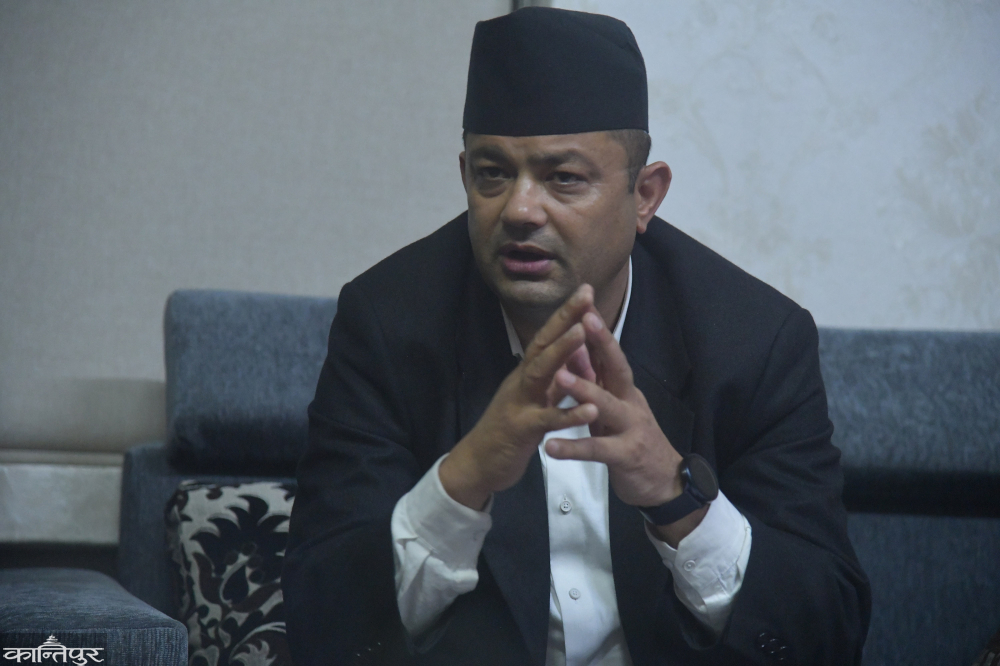 Yesterday you demanded that the then finance minister Janardan Sharma should be investigated because he came to the media and social media. This time, the victims of the cooperative have filed a complaint at the district police office in Kaski. Why is it difficult for you to form an inquiry committee to find out whether the Home Minister is involved or not? Parliamentary committee is not the only option to investigate
Yesterday you demanded that the then finance minister Janardan Sharma should be investigated because he came to the media and social media. This time, the victims of the cooperative have filed a complaint at the district police office in Kaski. Why is it difficult for you to form an inquiry committee to find out whether the Home Minister is involved or not? Parliamentary committee is not the only option to investigate
, there are also permanent bodies of the state . It is not our understanding that a committee should not be formed, it is a big crime if it is formed. However, if a committee is formed on a matter that does not have sufficient grounds for confirmation, the series of investigation committees and commissions on all matters may continue tomorrow. Committees are not the only option, there are also state-run agencies. Those agencies are still investigating and studying. If they do not believe after the conclusion of the investigation, then it is right to form an inquiry committee, till then it is better for the main opposition to be patient.
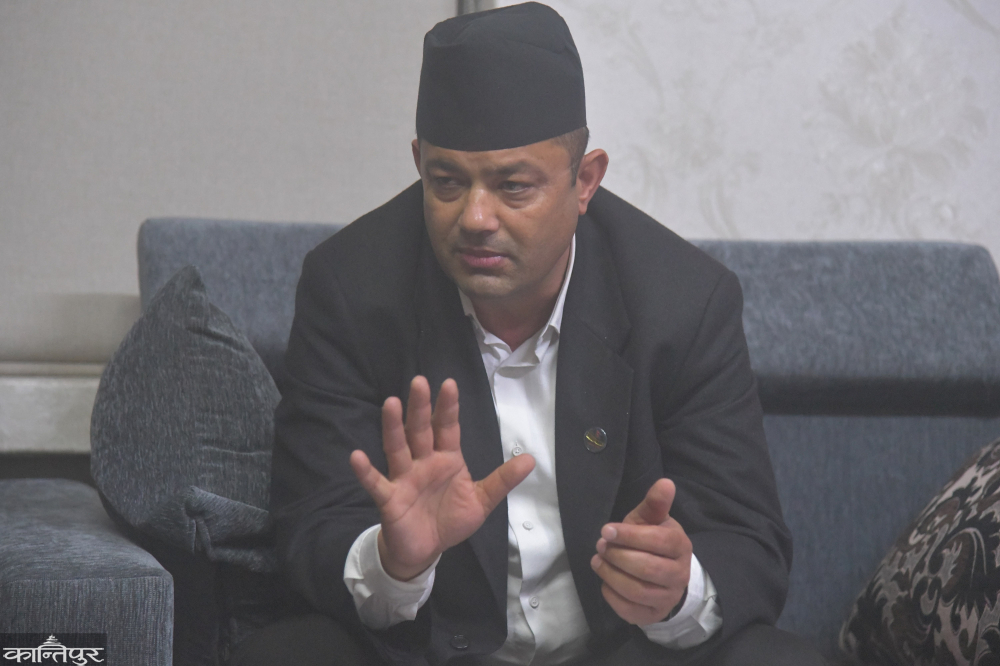 Yesterday, it was you who talked about setting up a commission of inquiry without trusting the state agencies in matters such as the gold scandal. Finally, the Judicial Commission was formed. Now, if the Home Minister himself is in the leadership of the investigating agency, how can an opposition party trust him?
Yesterday, it was you who talked about setting up a commission of inquiry without trusting the state agencies in matters such as the gold scandal. Finally, the Judicial Commission was formed. Now, if the Home Minister himself is in the leadership of the investigating agency, how can an opposition party trust him?
After the public statement that the Home Minister is not involved in misappropriation of the cooperative's savings from the responsible officials of the police, we have to believe it. If involvement is found through various investigations tomorrow, the police should be held accountable for the statements they have made public. I don't think that the police leadership expressed it lightly. It is also the right of the main opposition and common citizens to raise their voice that an inquiry committee should be formed if they are not convinced by the findings of the investigating agency. At that time, the government can also think.
What you are saying now, are you defending that the power equation is upside down, or do you really think that the Home Minister is innocent?
When it comes to good governance, anyone should be ready to stand in any court. In this matter, there should be no investigation on me, there should be no investigation, it is not good for anyone to present that I can do no wrong. However, it is not appropriate to make molehills, exaggerate the issue and go as far as to demand resignation. You have to think objectively. It is a request that everyone should support the investigation being conducted by the state agencies.
Why is the government in trouble after the main opposition party said that a committee should be formed for the investigation so that the ruling party will be the leader and the ruling party will have the majority?
When the ruling party forms a committee, some facts will come out. Like, let's look at the case of gold. Even though the inquiry commission was formed, the work of creating the commission was done by the government. It has been seen that if there are people who are trusted by the society and have a good image, then the committee formed by the government will also come up with a report to support the government.
When forming a parliamentary committee, if some facts come out, is there a fear that the power will be lost?
Like the gold case, this matter does not need to be constituted as a commission. The government should be very strict in matters of governance. The government at that time failed in some way in the direction of implementing the budget and maintaining good governance, from the formulation of the law, lessons should be learned from that. In the coming days, the necessary policies and laws should be clear to make the government successful. Recently we have come to the government. We are just getting to know the work of the ministry.
प्रकाशित : चैत्र १८, २०८० ०८:४५
 २०.१२°C काठमाडौं
२०.१२°C काठमाडौं










!['युवालाई उत्पादन र रोजगारीमा लगाउने ४–५ कार्यक्रम बजेटमा आउँदैछन्’ [अन्तर्वार्ता]](https://assets-cdn-api.ekantipur.com/thumb.php?src=https://assets-cdn.ekantipur.com/uploads/source/news/kantipur/2024/money-finance/min-bdr-shrestha-1252024053601-1000x0.jpg&w=241&h=158)






